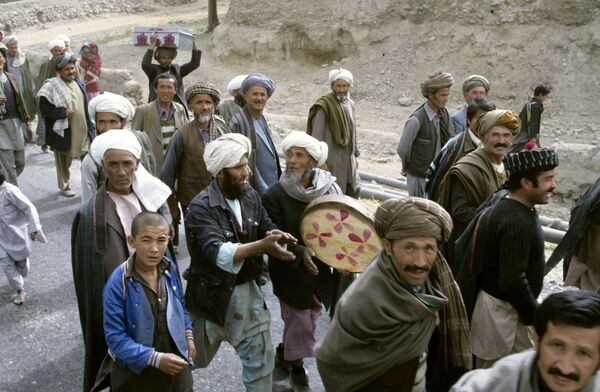MOSCOW. (Dmitry Kosyrev, RIA Novosti political commentator) - Thirty years ago, the Politburo of the Communist Party Central Committee made its decision to introduce Soviet troops into Afghanistan. The General Staff immediately formed a task force headed by General of the Army Sergei Akhromeyev to prepare for the operation.
However, when Soviet forces entered Afghanistan 30 years ago, the two states at least shared a common border. Today, the Islamic republic borders on Turkmenistan and Uzbekistan, which creates an entirely different situation.
Thirty years ago was also the beginning of the last phase of the USSR's existence and the establishment of a completely different political model in Central Asia. This model is still being formed today, although some people may think that the American and NATO troops are the only important factor in this process.
Nevertheless, a high-ranking Indian official recently reported that Indian public and private investment in Afghanistan has reached $1.3 billion to date.
There is also China, which will invest up to $3 billion into the Ainaka copper mine alone. Iran also maintains contacts in Afghanistan, albeit tacitly.
The end of the war is nowhere near, but Afghanistan's neighbors behave as if shooting has already stopped.
Ilkhomzhon Nematov, the Uzbek Ambassador to Russia, told the author of this article that the main threats to the security of Central Asia, including Uzbekistan, come from Afghanistan, which has been wrecked by full-scale war for more than 30 years and produces 90% of the world's heroin. In this context Uzbekistan is very interested in promoting peace and stability in Afghanistan and an early resolution to the Afghan crisis.
The ambassador added that Uzbekistan is working extensively with Afghanistan for the country's economic recovery. Uzbekistan has built 11 bridges in Afghanistan and supplies the country's northern provinces with electricity. It also delivers fertilizer and construction materials, such as cement, fittings, bricks, etc. to Afghanistan.
In addition, the Asian Development Bank (ADB) is actively involved in the construction of the Hairaton-Mazari Sharif-Herat railroad. The railroad will become a major infrastructure facility for the steady development of all of Central Asia.
It would be natural to ask the Uzbek ambassador how the efforts of his country correlate with those of the United States. And what is worthy of welcome?
Ambassador Nematov said that a large amount of the humanitarian aid supplied by the United Nations and a number of countries reaches Afghanistan through Uzbek territory. Like Russia and other countries of the region, Uzbekistan is also cooperating with the United States in the transit of non-military supplies to Afghanistan.
Mr. Nematov stated that Uzbekistan has always told America that it is ready to continue to cooperate with the United States on issues of mutual interest on the basis of equality, mutual respect and mutual benefit. This primarily involves combating international terrorism, extremism and drug trafficking, especially of heroin. Paradoxically, according to UN data, Afghanistan produced about 300 tons of heroin in 2001 and about 8,300 tons in 2008.
In this context, said the ambassador, Uzbekistan welcomes the U.S. administration's decision to send more troops to Afghanistan.
He recalled the initiative of Uzbek President Islam Karimov to establish a "6 + 3" contact group in order to involve Uzbekistan's close neighbors in the problem.
This group deserves special mention. President Karimov proposed reviving the group, which was in place before the 2001 U.S. war, at the NATO summit in Bucharest on April 3, 2008. The Uzbek President suggested that, as before, the group should consist of the six countries that border Afghanistan (Iran, Pakistan, Tajikistan, Turkmenistan and Uzbekistan), as well as "the three" - Russia, the United States and NATO.
Perhaps there are grounds to be displeased with Karimov's desire to add NATO to the former "6 + 2" contact group, or even feel jealous about his current proposal (why was it not introduced together with Russia or within the framework of the SCO, why isn't India part of it, and so on). But the important thing to note is the essence of the initiative - a group of Afghanistan's neighbors are already trying to assume the role of key players in the region.
The opinions expressed in this article are the author's and do not necessarily represent those of RIA Novosti.



